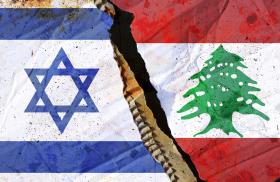
Sabereen's Suspension (Part 2): Causes and Consequences

The network's hiatus may have been ordered in response to its recent lean toward Russia, or perhaps its role in enabling a controversial arson attack on a political office.
Militia Spotlight assesses that the recent hiatus of militia media outlet Sabereen News was likely a forced suspension ordered by the muqawama (resistance) leadership and/or Iranian actors. We base this assessment on the timing and unusual length of the hiatus, as well as statements and actions by Sabereen personnel during a brief attempt to circumvent the suspension (see Part 1). Two circumstantial factors may explain why the network was slapped with a disciplinary suspension.
Proximate Trigger: Arson at KDP Headquarters
Tellingly, the hiatus began on March 28, immediately after muqawama members burnt down the main office of the Kurdistan Democratic Party in Baghdad, based on the pretext that KDP member Nayef Kurdistani had insulted Ayatollah Ali al-Sistani, Iraq’s highest Shia Muslim authority. Indeed, muqawama groups have sharply escalated their rhetoric against the KDP, as documented by Militia Spotlight.
Al-Etejah Television, an affiliate of the Iran-backed militia Kataib Hezbollah, was the first major outlet to publicly call for protests against the KDP. At 22:47 Baghdad time on March 27, the network posted a breaking news alert on its Telegram channel that read: “After Nayef Kurdistani infringed on the religious reference [i.e., Sistani], a protest has been organized in front of the KDP headquarters in Baghdad, now” (Figure 1).
Sabereen published its first post about the protest at 23:06, by which time muqawama members were already heading to the KDP offices (Figure 3). Its post took the form of a poll asking people to indicate whether they were ready to go out (Figure 2), presumably a kind of mobilization signal. Afterward, Sabereen pushed out a burst of posts explicitly mobilizing muqawama members and supporters.
Perhaps more important, after the KDP headquarters was set alight, Sabereen claimed that its “special force” had prevented firefighters from reaching the burning building by blocking the main access road (Figure 3). This was the first time Sabereen had publicly announced that it has its own vigilante/thug group. In the past, the network had indicated close cooperation with other muqawama vigilante groups such as Raba Allah, but never that it had created a group of its own. When arrests were made at the arson scene, some Sabereen administrators may have been detained and had their electronics seized, resulting in a security breach of the network's systems.
Meanwhile, the broader muqawama tried to distance themselves from the arson, which came at an inopportune moment in the Iraqi government formation process—namely, just as pro-muqawama politicians were making new entreaties to the KDP for partnership. On March 28, Kataib Hezbollah's online "spokes-persona" Abu Ali al-Askari stated, “The burning of the party’s offices is unacceptable to us, including what happened yesterday.” His declaration showed considerable chutzpah given that al-Etejah TV had called for the protest in the first place (Figure 4).
Longer-Term Driver: Sabereen's Pro-Russia Tilt
Another potential reason why Sabereen was suspended may lie in the network's breathless coverage of the Ukraine war. Militia Spotlight has previously reported on how Sabereen had become a tool (witting or unwitting) of Russian information operations during the first quarter of 2022. More likely than not, Russian officials and Sabereen operators have actively and knowingly cooperated.
Such collaboration may have been a step too far, not only for some Iraqi muqawama leaders, but also for their Iranian sponsors. Although Tehran and the muqawama have taken Russia’s side in the war, their media outlets have largely avoided glorifying Moscow and Putin in the manner Sabereen has. In fact, some militia leaders have expressed caution over supporting Russia. For example, Kataib Hezbollah secretary-general Ahmad Mohsen al-Hamidawi (aka Abu Hussein) issued a statement on February 27 describing both sides of the war as “unjust” and “bloodthirsty,” asserting that the so-called axis of resistance “should not take sides.” Moreover, muqawama leaders are well aware that Russia has given Israel substantial leeway to attack their fighters in Syria.
Previous Sabereen hiatuses have often been followed by a change in content and activity, possibly indicating new direction, leadership, or personnel. This occasion is no different: when Sabereen resumed its activities on April 8, its coverage of Russia's war was toned down substantially. The channel did release a YouTube interview with Aleksandr Dugin, an extremist Russian political theorist linked to Putin. But the video had been announced and recorded before the hiatus, and the fanfare that accompanied its release was muted.
What This Incident Tells Us
Sabereen has always been a prize that muqawama groups compete to dominate. The network has changed leadership multiple times in recent years, creating pressure, paranoia, and exploitable fissures within its senior ranks. This episode also provides yet more evidence that Sabereen serves at the pleasure of others—although the network is proud of the position it has built for itself as a premier muqawama media platform, it remains answerable to a higher authority with the power to enforce an extensive shutdown. The mechanism for the latest suspension may have involved the confiscation of Sabereen devices and/or account passwords, as well as real or threatened punishments against network personnel (e.g., withdrawal of funding, physical detention). This is strong evidence of centralized direction, control, and financing by either a cross-muqawama leadership or Iranian sponsors.









